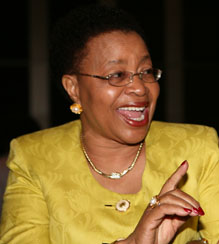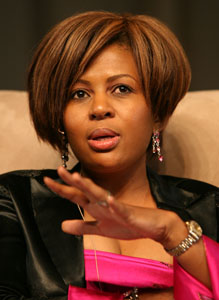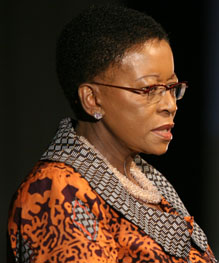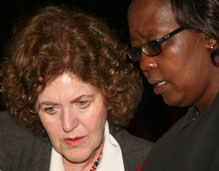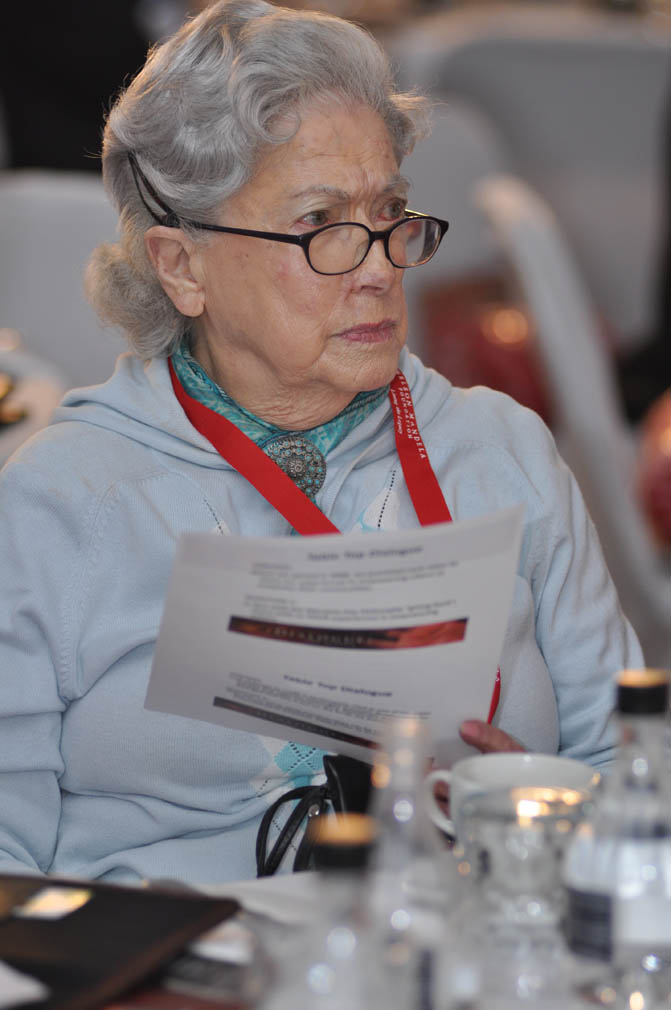
Aug 22, 2008 – Women need to empower one another, to raise themselves and society as a whole. This was the message from the Malibongwe Dialogue held at the Sandton Convention Centre this morning.
Women of different ages and walks of life from all over South Africa joined together to discuss the challenges women face in the new South Africa – and ways to solve them.
The event – organised by the Nelson Mandela Foundation’s Dialogue Programme, the national Department of Arts and Culture and the National Youth Commission – was a celebration of women and their role in society. A booklet capturing the event will be published soon and will be available in printed format and for download from the Foundation’s website.
Performer and poet Bosiswa Gqulu pointed out that “When you educate a woman, you educate a nation,” while Deputy Minister of Arts and Culture Ntombazana Botha’s welcoming note highlighted the strengths and values of women. “All of us are leaders in this room,” she asserted.
Split into two sessions, the first part of the dialogue dealt with the challenges women face in business, while the second looked at how South African women needed to learn from each other and from the lessons of the past.
Called “Business Unusual: Speeding up Economic Empowerment for Women”, the first part was aimed at finding ways of overcoming the challenges women in business face in South Africa.
Business woman Angie Makwetla, the moderator of the first session, asked the participants to keep in mind that the function of the dialogue was to “carry on his [Nelson Mandela’s] vision of building a people-centred society”.
The panel, led by Makwetla, consisted of lawyer and businesswoman Thandi Orleyn, third-year BCom student at Wits Naledi Kekana, and TV personality and businesswoman Basetsana Khumalo.
All three of the panellists highlighted just how much work still needs to be done in order to economically empower women in this country. As Khumalo pointed out there are only 13 women CEOs of listed companies in South Africa and there is a desperate need for current women leaders to act as mentors.
“We have a collective responsibility to lift as we rise,” Khumalo said.
For Kekana, there were three major issues that needed to be addressed in order for the economic empowerment of women to occur. Her first point was that today’s economic policy helps only a small percentage of the population and that in order for women to benefit there needed to be a new and inclusive economic policy.
“Without a paradigm shift,” said Kekana, “We will never see the adequate distribution of wealth.”
However, as Kekana pointed out next, women needed to be safer in South African society. “You can be the most empowered woman in South Africa, but that does not make you immune to a black eye or being raped,” was her poignant remark.
Thirdly, reiterating Khumalo’s point about mentoring, Kekana called for inter-generational dialogues in order for women to learn from each other.
“Mentorship is one thing that I don’t think is happening enough in this country,” Kekana said.
The solution, as Orleyn pointed out next, was for women to take responsibility for the changes that need to occur to economically empower women in society.
“Post-1994 we are abdicating our responsibility to the state,” she said. “It’s time now to accept that we are the ones who must take responsibility and take up the challenge.”
At the end of the first session, the tables were asked to consider three questions:
- What is my personal involvement/experience in the empowerment of women, in South Africa regionally and the rest of the continent?
- My views on the institutional involvement in the empowering of women/improving collaborations in all current activities?
- Our role in facilitation/accelerating the empowerment of women in the global environment?
Session two, entitled “Harvesting from Each Other,” looked at how women should learn from each other as well as how the struggle against apartheid should inform the way forward.
As business woman Cheryl Carolus, moderator of the session, pointed out, “Many people in this room have paid the price of getting us to the point” – that the soil of our current society has been watered by the blood of those who have come before us.
Joining her on the panel was author and ex-trade unionist Pregs Govender, Hector Pieterson’s sister Antoinette Sithole, General Secretary of the South African Men’s Forum Mbuyiselo Botha, CEO of the Moral Regeneration Movement Zandile Mdhladhla and National Youth Commission Chairperson Nomi Nkondlo.
Every member of the panel discussed the need for all South Africans to nurture the seeds that had been planted by our predecessors, and to learn lessons from the past.
For Botha, the message was clear: the struggle could not be considered a success “when women can’t walk freely”.
“For us to enjoy this freedom,” he continued, “it’s important to acknowledge the role women have played in the fight for freedom now and in the future.”
It was a message that was reiterated by the panel.
The time has come for women leaders to take responsibility and harvest the fruit of those who preceded them – but also to sow new seeds, for future generations.
Reflections
Zandile Mdhladhla, Moral Regeneration Movement
“It’s been a very empowering session of seeing women united and looking for solutions, acknowledging people who have gone before them, and saying we aspire to live the values Nelson Mandela embodies. It was enriching and there was a good collection of powerful women. I hope that the knowledge gained here will be used and transferred into other spheres of their lives.
“Women are talking, but more particularly the feedback we are receiving is that women want to see action. They are not mutually exclusive. They go hand in hand – talk and act.”
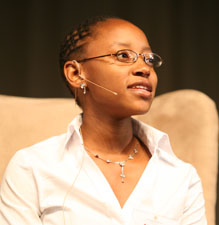
Naledi Kekana
Naledi Kekana, student and Malibongwe panellist
“Women are still alive in the country – we are there and committed to advancing the struggle. What struck me was the call to report back at this forum next year, about what we’ve achieved. We need to make a personal commitment to the empowerment of women.”
Criselda Kananda, Metro FM
“We need to learn to participate as women. It’s about time we changed the agenda of business, communication, and so many things we do, to fit in with who we are as women. The time is now!”
Mothomang Diaho, Nelson Mandela Foundation Dialogue Programme
“This dialogue was on another level. We have been challenged today. It’s quite clear that the invites next year for the Malibongwe Dialogue will be based on bringing people back to report on what they’ve achieved.”
Wanda Mkutshulwa, South African National Parks
“It was wonderful. I’m leaving here today with the thought that there is no such thing as a fully empowered woman – every woman is at a level, but still has something to learn. Empowerment for women is a constant journey, it’s not a destination.”
Paddy Nhlapo, Cool Ideas
“We as males need to be empowered to understand what gender equality is about. We need to be the change, too.”

Joyce Sikhakhane-Rankin
Joyce Sikhakhane-Rankin, writer and activist
“It’s the continuous recognition of the inspiration which Madiba has on all of us as woman. It’s continuous. And also this is a man who says let’s move on. Let’s forget and forgive each other.”
Nomi Nkondlo, National Youth Commission
“It was very empowering; I learnt a lot and the feedback that I got from the audience gave me goose bumps. The harvest theme was a very powerful one. We need to grow crops and give them time to mature before harvesting them so that we can reap a good harvest. I hope that young women were inspired so that we can pass the baton to them.”
Busiswa Gqulu, poet
“It was inspiring, inspiring, inspiring. It’s a difficult struggle and it will take time, but all in all, I’m really inspired.”
Elizabeth Thabethe, deputy minister, Trade and Industry
“If we continue with these dialogues we will be able to deal with challenges and in turn empower women. The audience was remarkable – there were different people from different spheres of life. The legacy of our living legend Nelson Mandela will forever guide us.
Pearl Thloloe, Youth Alive Ministries
“The panellists were spot on; I feel so empowered. The generation groups were all represented, but they spoke the same language. I feel so empowered and grateful that there were so many people under one umbrella.”
Fungi Rakoena, Department of Arts and Culture
“Next year these dialogues must be taken to all the nine provinces so that women in the rural areas who can’t interact with these business women and members of parliament can benefit, learn and share experiences.”
Vincent Kgomo, Nelson Mandela Children’s Fund
“This dialogue was very inspiring, especially for me as a man. It encouraged me to look at ways to support women and to ensure that girl children find a way to business. It also means that we must close the generation gap by empowering the youth. I will not be happy with myself if I miss a next session of this nature.”
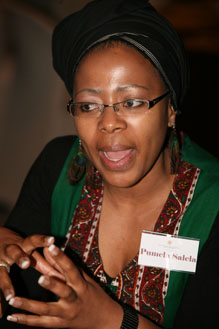
Pumela Salela
Pumela Salela, Trade and Industry
“Naledi Kekana was a highlight. It seems as you get older, you get more concerned about what you say – she reminded me of that spark you have in youth, that spirit of fearlessness and speaking your views. We should never lose that spark.”
Erica Nkuhlu, business woman
“It was very interesting – I gained a lot and I started questioning myself. What am I doing to plough back to the community? If I haven’t started then I must start, but all in all, it was very informative.”
Andile Gaelesiwe,TV personality (Open Disclosure)
“We need to afford women spaces for healing because they are abused, beaten and trampled on and they can’t look for jobs if their self-esteem is low. We need to take care of the wellbeing of women.”
Ntombazana Botha, deputy minister, Arts and Culture
“One thing that struck me was that the women here are the women of South Africa, irrespective of where they are from, race, background and so on – the diversity is amazing. It shows that women’s experiences are the same. It falls on us to try to come together and make a difference in our own lives. We are in this struggle together.
“Looking at everyone here, I was thinking that we have the power to bring about change.
“And although this is the second dialogue, I don’t think we have actually got to the depths of what we need to address – we only have the bones. We need more of this to encourage one another and strengthen one another so we can go out and do the things we’re able to do. We need to break barriers, break the silence and begin to address the issues.
“I often take my cue from the quote I mentioned [from Nelson Mandela, about South Africa not being free until women are free]. I read it and reflect on what he meant and what I’m supposed to do.”
Thuli Leso
“It was an eye-opener; the first time I’ve been in the same environment as people like Graça Machel. I think of them as my mentors. But I am also a leader and have a part to play.”
Joan Joffe, business woman
“It was an inspiring morning with lots of diversity. I was fortunate that at my table there were two deputy ministers. The discussion was very illuminating for me. The main theme was that there are resources and structures to provide for the poor, but there is a lack of communication from government to the people. Government is not accessible to people and we need to find ways to fix that. The other theme was that empowerment is a great-sounding word, but does it mean giving people money and things or rather ‘teaching a person how to fish’?
“The panellists were well chosen, diverse and articulate. I came away with a lot to think about. Each of us has a contribution to make and we should build this into our consciousness.”
Zandi Gamedze, Gauteng Department of Housing
“The most important thing is to be part of the harvest; to go back, replant and in a tangible way empower other women.”
Nonhlanhla Mlahleki, Nelson Mandela Children’s Fund
“This type of dialogue shows a great need for our society to mobilise, to make it a better society.”
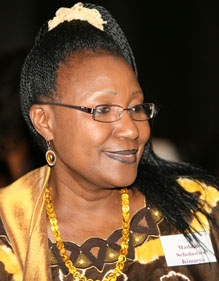
Scholastica Sylvan Kimaryo
Scholastica Sylvan Kimaryo, United Nations Development Programme
“This was a gold mine of inspiration in a double way. First, it’s a celebration of 90 years of Nelson Mandela, who was drawn from the soil of this country. The struggle against apartheid, and the dreams and aspirations of South Africans, were always supported and shared by others in Africa. ... The other part is that it’s a celebration of South African women and their contribution to freedom and now economic freedom too. The theme of ‘business unusual’ is so important: how to harness the same energies that brought down apartheid, to build the country economically. ‘Business as usual’ is no longer an option.
“What I’ve come away with is that people talk about the ‘lost generation’ and ‘disadvantage’, but that’s not our reality – each one of us is capable of being anything we want to be. It starts with individuals: each of us should go out and do more to support each other. And we have to hold each other accountable.
“Lastly, my thoughts about being here as a leader in the UN system: the UN has a vested interest in this country. The UN was the custodian of South Africa’s struggle for 30 years and we still have an opportunity to support your efforts towards transformation – especially a rights-based transformation, based on the values enshrined in UN conventions. This country became democratic at a time when there was hope of the whole world moving towards democracy. But the world has not shown the dividends of peace. South Africa still strives towards those values and the UN needs this country to succeed on a normative basis and give hope to others.
“It was a privilege to be part of this process and I will recommit to whatever I can do in my personal or professional capacity.”
Nonto Nhleko, life and business coach
“Today was a reinforcement of what we already know, but don’t focus on. We don’t walk the talk as much as we should in terms of empowering one another. Presentations like these are inspiring.”
Yoliswa Makhasi, Youth Commission
“I think it was wonderful. The dialogue was a success obviously. In the first panel, the generational link in the panel worked very well. It was straight to the issues of economic participation between young women and older women, and the importance of mentorship. I thought it was powerful.”
Tumi Makgabo, broadcaster and business woman
“The whole thing was a useful exercise in terms of picking influential women’s brains. What I would like to see is some kind of feedback after this, and also an opportunity to actually galvanise the women who were in the room to action. Don’t turn it into a talk shop.”

Tu Nokwe
Tu Nokwe, musician
“When women get together, I tend to be overwhelmed by the power in the room. We need more time to spend together and feed off each other. I’m grateful for the time we’ve had to be together today.”
Rica Hodgson, anti-apartheid activist
“I was glad to see just how many young people there are here today, and how enthusiastic they are; never mind only building themselves up into positions, but wanting to do something for the country as well.”
Angie Makwetla, business woman
“I thought the highlight was the importance of ploughing back and leaving a legacy, and I am very encouraged to meet with the likes of Mrs Graça Machel. The passion is there. The commitment is there, but next year we must come back and report on what we have done, so that all the women who were here today know that we are keeping an eye on them. We want to see the results.”
